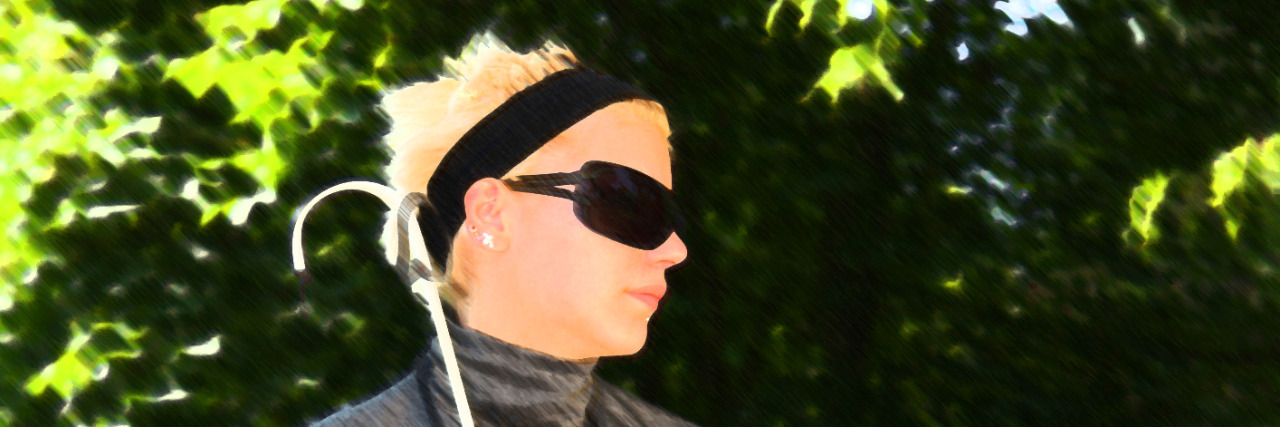I have retinitis pigmentosa. I don’t suffer from retinitis pigmentosa.
Let me explain. Living with retinitis pigmentosa isn’t always easy. I have embraced it and have had a lot of great experiences directly related to my diagnosis of RP and legal blindness. But I still have bad days, such as recently when I was walking and hit an open filing cabinet and had a resulting concussion. But I still don’t suffer from RP.
I feel like I suffer more because of ableism. According to the Oxford English Dictionary, ableism is: “the systemic oppression of a group of people because of what they can or can not do with their bodies or minds as the result of ignorance.” In simple terms, it’s when people’s practices around and attitudes toward people with disabilities devalue and limit people with disabilities, or they discriminate in favor of “able-bodied” people. It’s not the actual condition or disability itself that is the limiting factor, it’s society’s perception and treatment of people with disabilities.
I have faced a lot of ableism over the years, but a few specific examples come to mind:
- Even though a PowerPoint presentation is completed in order to present to the audience, the presenter won’t give me a copy of it until after the presentation. Therefore, while people who are sighted can have access to the presentation materials during the presentation, I don’t have access to them until after. Ableism.
- I’ve also heard the term, and not in relation to me, “the blind leading the blind,” a lot.. Now sometimes, people do joke about it when one of my best friends (who is blind) and I are leading each other… it truly is “Blind leading the blind.” But more often than that, it’s in relation to somebody who is directionally challenged leading around somebody else who is directionally challenged and they just end up going in circles. I am pretty good about getting to where I need to go and am pretty good with directions nowadays, and I am also blind. So this phrase can be offensive. Ableism.
- I can’t tell you how many times people ask my boyfriend if I want something or if I need something, when I’m right there. They assume because I’m blind I can’t express my own needs or desires and they have to ask him. If you know my boyfriend, you know he is super quiet, so he usually just goes “uhhh…” and then looks at me to respond for myself. Ableism.
- People have either grabbed my cane or my guide dog harness handle to “help” us across the street or get to a destination. They assume we need help, just because I have a disability, even though they never asked. This usually does a lot more harm than good and is incredibly frustrating. Ableism.
- I’ve been introduced as someone’s “blind friend” before. Now if my best friend I mentioned earlier who is also blind wants to explain how we met because we both have the same eye condition and disability, that is usually OK. But if someone without a disability introduces me and one of the first things they use to introduce me is my disability? That’s not OK. Ableism.
Those are just a few examples of how I’ve experienced ableism. Unfortunately, people with all kinds of disabilities experience ableism on a regular basis. People without disabilities often think that by providing one type of accommodation, it is the right fit for all people with disabilities. That is not true and is ableist. People use ableist language all the time and it is damaging to people with disabilities. For example, how often have you heard, “What, are you deaf?” or “You’re blind as a bat!” These can be insulting to people who really are blind or deaf. “Crazy” is a term a lot of people use when somebody’s doing incomprehensible things, but in the past it has been used to describe people with mental illness.
Why is ableism not OK? Besides the fact that it is point-blank discriminatory toward people with disabilities, it suggests that people with disabilities are lesser than people without disabilities. I often compare it to sexism because that’s more widely understood. Sexism is when people automatically think men are better than women. This is not the case; neither are people without disabilities are naturally greater than people with disabilities.
I don’t like term “suffers from” in relation to any medical condition in general, because it’s not person-first. However, I do recognize that there are people who truly do suffer from their medical condition and choose to use this language when describing themselves. I, however, feel that in general I do not suffer from my eye condition. I suffer from society’s view of people who are blind. I suffer from ableism. If people would stop assuming that I am lesser and start recognizing me for my abilities, I would not have the struggles I do today and RP would not be a big thing in my life. It would just be part of it. But because I have to tackle ableist views so often, RP is a bigger player than it needs to be.
We want to hear your story. Become a Mighty contributor here.
Thinkstock photo by Otto Kalman.

